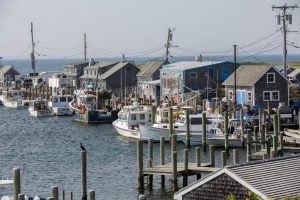Episode 48: The Catch

Alex Ciccolo — a 24-year-old who was arrested two years ago in Adams, Massachusetts on charges of attempting domestic terrorism — is back in the news. His mother spoke with our reporter Jill Kaufman. Later in the show, we take a look inside the world of eel trafficking in Maine, and learn about an effort on Martha’s Vineyard to help small fishermen get a foothold. Plus, we discover the surprising origins of a body pulled in by a fishing boat off the coast of Cape Cod, and explore our region’s ambiguous relationship with inclusivity through the arts.
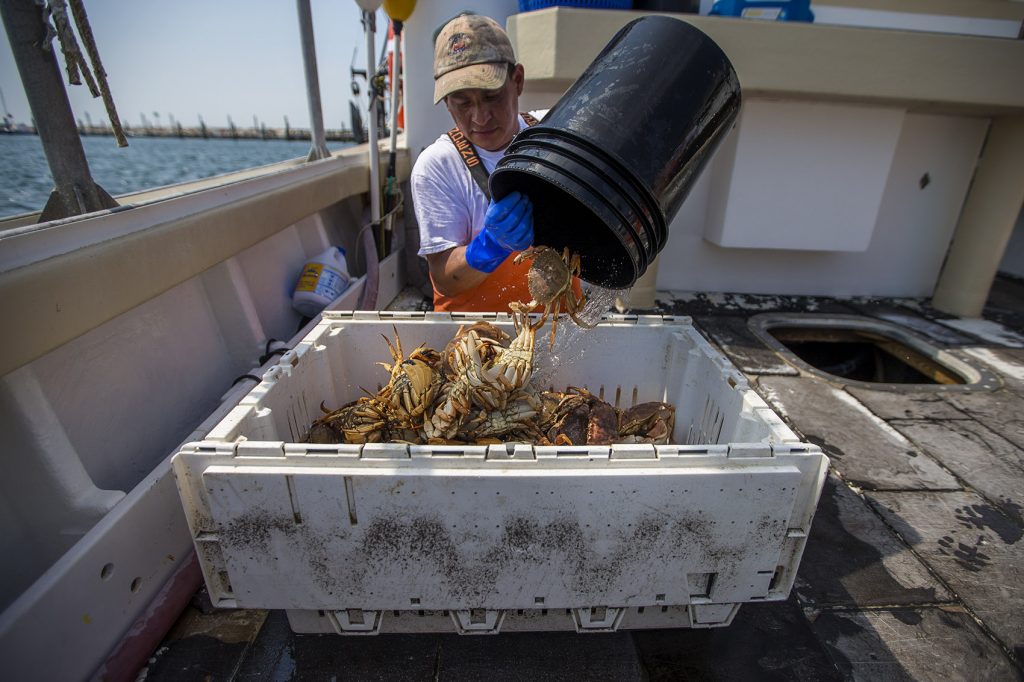
On the fishing boat Diversion, Marvin Benitez dumps a pail full of crabs into a bin for preparation for sale to seafood retailers and restaurants on Martha’s Vineyard. Government-issued permits for fishing rights can be expensive, but nonprofit permit banks are leasing them to small fishermen at lower rates. Photo by Jesse Costa for WBUR
In Despair, and Angry
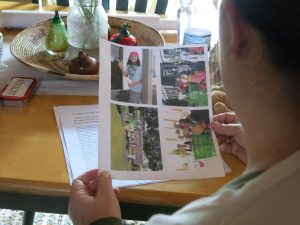
Shelley MacInnes holds pictures of her son, Alex Ciccolo, who faces domestic terrorism charges. Photo by Jill Kaufman for NEPR
Alex Ciccolo, 24, of Adams, Massachusetts, has been in federal custody since July 4, 2015. He’s charged with attempting to commit domestic terrorism.
Ciccolo’s father is a Boston police captain, and was among the first responders at the 2013 marathon bombings. He was the one who tipped off federal officials his son was becoming “obsessed” with ISIS. That led to an FBI sting, where Ciccolo described to a government informant his plans to explode pressure cooker bombs in a crowded place.
After Ciccolo’s arrest, his father made a single statement to the public. His mother, Shelley MacInnes, has kept an even lower profile, until recently. New England Public Radio’s Jill Kaufman reports.
Below, Alex Ciccolo is interviewed by the FBI hours after his 2015 arrest.
Reporter Trevor Aaronson of The Intercept has been investigating the connections between domestic terrorism charges that have led to 800 arrests since 9-11. He told Jill Kaufman how Alex Ciccolo fits into the mix.
Hauling It In
The Massachusetts fishing industry in recent years has taken a beating. Stiff regulations and expensive fishing permits are making it difficult for small fishermen to stay above water.
A nonprofit in Martha’s Vineyard now wants to help by acquiring fishing permits, and leasing them at subsidized rates to emerging fishermen. WBUR’s Simon Rios reports.
What’s slippery, see-through, and goes for $1,300 a pound? Listeners in coastal Maine probably know the answer.
Our guest Rene Ebersole is a contributing writer for National Geographic and a reporter for the Food and Environment Reporting Network. Her recent article: “Inside the Multi-Million Dollar World of Eel Trafficking.”
Glass eels are American eels in their juvenile phase. The price per pound of these animals jumped from $99.94 in 2009 to $891.49 in 2011. In 2012, it went over $1,800.
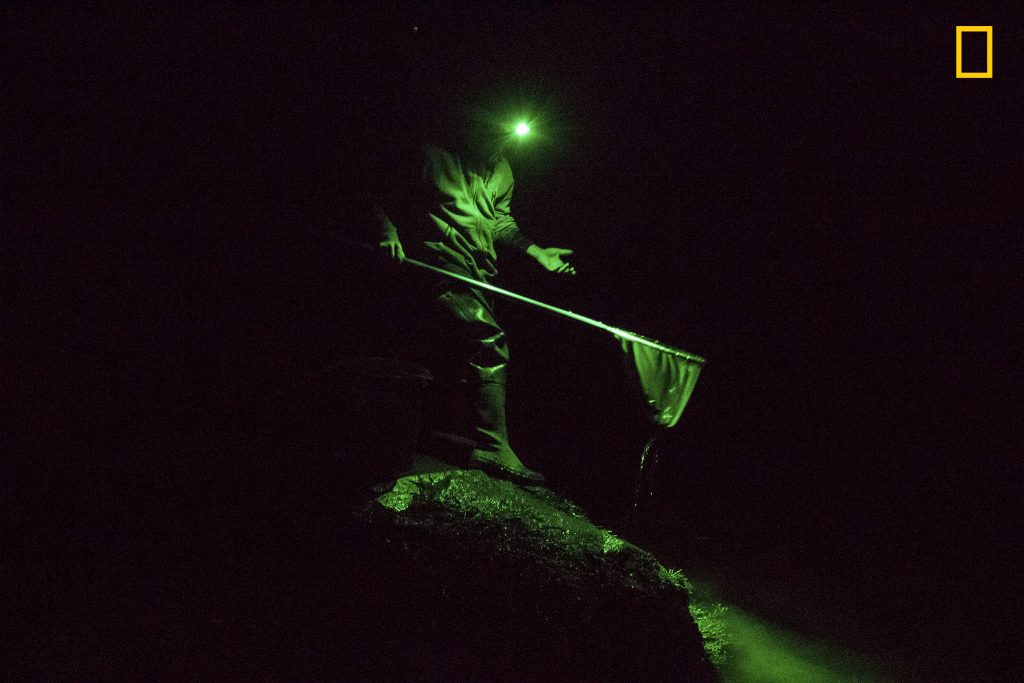
Alvah Wendell, 43, rhythmically swishes his dip net to catch young eels as they swim up the Bagaduce River in Maine. He uses a green headlamp because white light spooks the fish. “You don’t need to see them to catch them,” he says. “But I like to watch.” Photo by Sarah Rice for National Geographic
The little eels are destined for aquaculture farms in Asia, where they’re later harvested for sushi.
The demand for American eels skyrocketed earlier this decade, because the European Union banned eel exports in 2010. European and Asian eels are considered superior to American. The 2011 tsunami, which damaged Japan’s fishery, also had an impact.
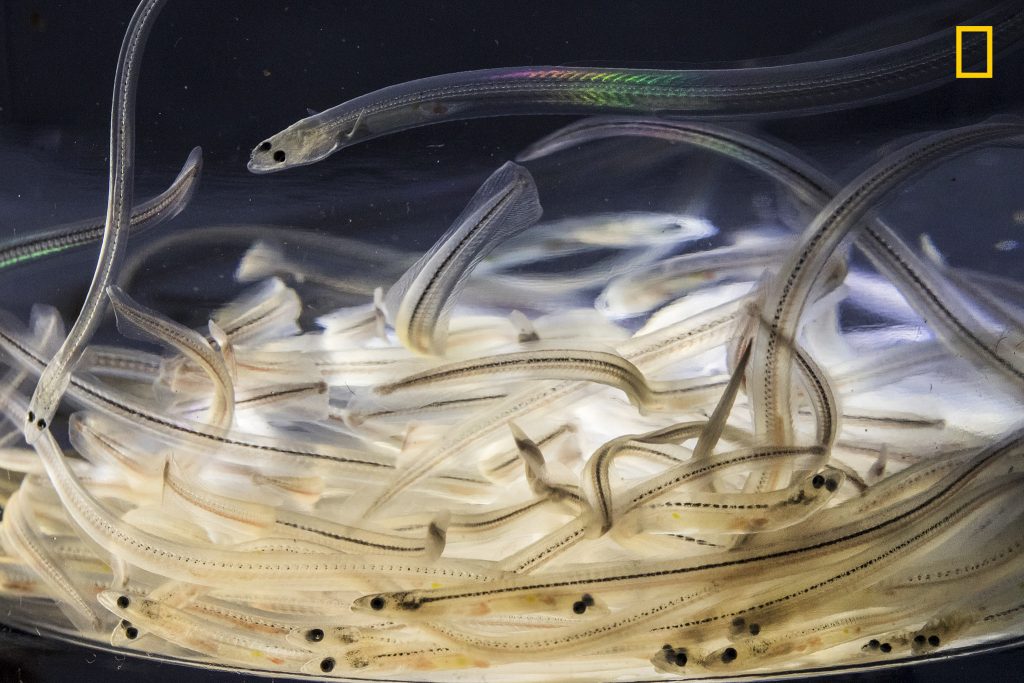
Eels transform from leaf-shaped larvae into two-inch elongated juveniles with haunting eyes and a visible spine just before they swim from the ocean up freshwater rivers. Photo by Sarah Rice for National Geographic
These days, if you’re in the eel-catching business, Maine is the place to be. Fishing for American eels is illegal in every other East Coast state, except for South Carolina and Florida, where fisheries are small. High prices have led to poaching. In March, two Maine fishermen, Bill Sheldon and Timothy Lewis, were indicted for illegally trafficking wildlife. Sheldon could face a maximum of 35 years in prison.
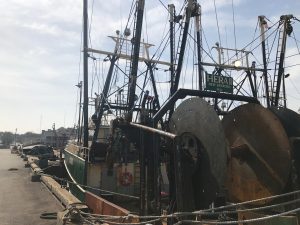
The Hera II, sister ship to the vessel that brought in a very unexpected catch last year. Both boats are draggers, trailing nets that scrape the ocean floor for groundfish. Photo by Andy Short
Whether you’re catching eel swimming upstream or haddock in the Atlantic, the work of fishing can get monotonous. On an early December morning, that routine was upended for the crew of the Hera, a commercial groundfishing boat from New Bedford, Massachusetts. Andy Short has the tale.
Craving more fishy news? Listen to our own Episode 35: Outfished. You’ll learn about Carlos Rafael, a.k.a. “the Codfather” — the New Bedford fishing magnate who in March plead guilty to 28 counts of fraud. (On a side note, Rafael just happens to be the owner of the Hera).
Making Good Neighbors
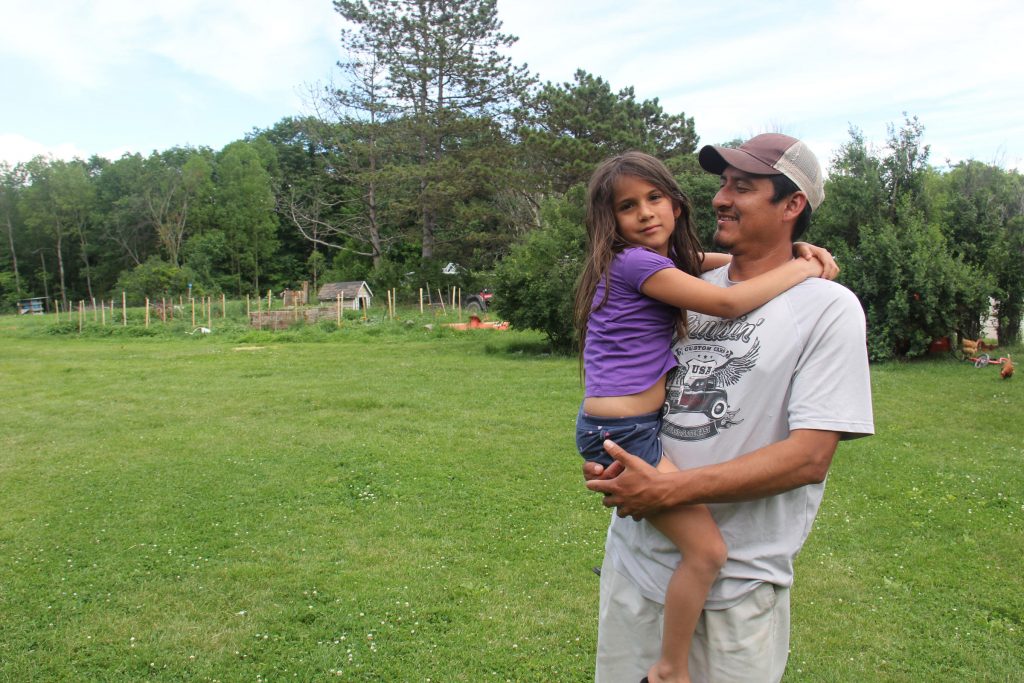
Juan De La Cruz comforts his youngest daughter, Isabella, at their home in Vergennes, Vermont. Photo by Kathleen Masterson for VPR
A Vermont father of six is facing deportation to Mexico in a case that highlights shifting federal immigration enforcement priorities.
Juan De La Cruz came to the U.S. illegally over a decade ago, and later married a U.S. citizen. They formed a family and a farm business together, and Juan obtained a federal work authorization permit. But a previous deportation on his record now makes De La Cruz a target for ICE. Vermont Public Radio’s Kathleen Masterson has the story.

Visiting the ICA on vacation from Colombia, Maria Alejandra Garcia Velez and her daughter Maria Jose Cortes Garcia, 9, approach the shoelace work by Nari Ward, “We the People.” Photo by Jesse Costa for WBUR
Life often inspires art, and art in turn often reflects society.
In a time of divisive political discourse, especially around immigration, an art show currently featured at Boston’s Institute of Contemporary Art opens up a space for dialogue. The exhibit offers museum-goers a glimpse into the naturalization process and what it means to be, and to become, American. WBUR’s Shannon Dooling takes us there.

Thea Alvin is a “dry mason,” meaning she builds stone walls without using mortar. Photo by Amy Noyes for VPR
Of course, we know that New Englanders have, and have always had a rocky relationship with inclusivity. For instance, the famous line from Robert Frost’s 1912 poem “Mending Wall” — “Good fences make good neighbors” — has been used to describe Yankee culture.
But building stone walls like the one in Frost’s poem has become something of a dying art. Stonemason Thea Alvin explained to Vermont Edition how she builds her walls for their series “Summer School.”
About NEXT
Do you have a question about New England you’d like NEXT to investigate? Tell us about it here.
NEXT is produced at WNPR.
Host: John Dankosky
Producer: Andrea Muraskin
Executive Producer: Catie Talarski
Digital Content Manager/Editor: Heather Brandon
Contributors to this episode: Jill Kaufman, Simon Rios, Andy Short, Kathleen Masterson, Shannon Dooling, Amy Noyes.
Music: Todd Merrell, “New England” by Goodnight Blue Moon
Special thanks this week to Jane Lindholm at Vermont Edition
We appreciate your feedback! Send critique, suggestions, questions, reflections and wildlife trafficking tips to next@wnpr.org.

